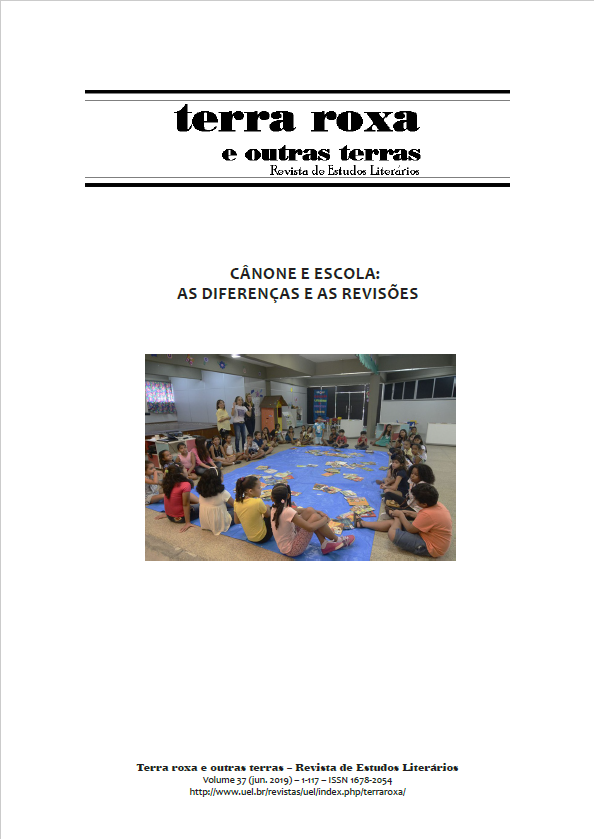The lord of the rings and the canon
DOI:
https://doi.org/10.5433/1678-2054.2019v37p104Keywords:
Canon, School, Tolkien, CriticismAbstract
About eighty years ago J. R. R. Tolkien published the first work that would compose an entire mythical universe. From this first publication, the Tolkienian literature consecrated itself from its readership and impelled a new market segment. The Lord of the Rings is an integral work of this mythical universe and one of his most popular works, besides being a reference for fantasy literature. However, since its first publication, Tolkien is despised among the academic community, which advocates for the study of canonical works. The literary canon has the power to consecrate certain works, but at the same time that the canon includes and legitimizes certain works, it also ends up excluding many others, as the case of The Lord of the Rings. From this perspective, the present work proposes to analyze the relationship between the canon and The Lord of the Rings, in view of the representativeness of the work before the young reader and its importance among the genre to which it is inscribed.Downloads
References
ABREU, Márcia. Cultura Letrada: Literatura e leitura. São Paulo: UNESP, 2004.
BAUMAN, Zygmunt. Modernidade líquida. Trad. Plínio Dentzien. Rio de Janeiro: Zahar, 2001.
BLOOM, Harold. O cânone ocidental: Os livros e a escola do tempo. 2. ed. Trad. Marcos Santarrita. Rio de Janeiro: Objetiva, 1995.
BLOOM, Harold. 35 milhões de compradores de livros podem estar errados? Wall Street Journal, 2/11/2000. Trad. Danielle Crepaldi Carvalho, do artigo "Can 35 Million Book Buyers Be Wrong? Yes". Disponível em <http://wrtbrooke.syr.edu/courses/205.03/bloom.html> Acesso em 06 mai. 2018.
BLOOM, Harold, (org.). Bloom's modern critical interpretation: J. R. R.Tolkien's The Lord of the Rings. New York: New Edition, 2008.
BORGES, Jorge Luis. Esse ofício do verso. Trad. José Marco Macedo. São Paulo: Companhia das letras, 2000.
BRASIL. Ministério da Educação. Orientações para o ensino médio. Linguagens, códigos e suas tecnologias. Brasília: Ministério da Educação, 2006.
CANDIDO, Antonio. Literatura e sociedade. 9. ed. Rio de Janeiro: Ouro sobre azul, 2006.
DURÃO, Fábio Akcelrud. A crítica literária como questão. O que é crítica literária? São Paulo: Nankin, 2016, pp. 10-21.
FRANCHETTI, Paulo. Crítica e saber universitário. Alcides Cardoso Santos (org.). Estados da crítica. Curitiba: Editora da UFPR, 2006, pp. 48-61
FOUCAULT, Michel. A ordem do discurso. Trad. Laura Fraga de Almeida Sampaio. 3. ed. São Paulo: Loyola, 1996.
GIRON, Luís Antônio. Elas não são idiotas. Entrevista: Harold Bloom. Época (São Paulo), n. 243, 03 fev. 2003. Disponível em <http://revistaepoca.globo.com/Epoca/0,6993,EPT479197-1666-1,00.html>. Acesso em 05 mai. 2018.
MICHAELIS. Moderno dicionário. Dicionário brasileiro da língua portuguesa. São Paulo: Melhoramentos, 2018. Disponível em <http://michaelis.uol.com.br/moderno-portugues/busca/portugues-
brasileiro/Cl%C3%A1ssico/>. Acesso em 21 mai. 2018.
PERRONE-MOISÉS, Leyla. Altas literaturas: Escolha e valor na obra crítica de escritores modernos. 2. ed. São Paulo: Companhia das letras, 2009.
PERRONE-MOISÉS, Leyla. O lugar do crítico. Texto, crítica, escritura. 2. ed. São Paulo: Ática, 1993, pp. 15-34.
PEREIRA, Andréa Kluge. Biblioteca na escola. Brasília: Ministério da Educação, 2006.
SANTIAGO, Silviano. Literatura e Cultura de Massa. Novos Estudos CEBRAP, vol. 38, pp. 89-98, 1994. Disponível em <http://novosestudos.uol.com.br/wp-content/uploads/2017/05/09_literatura_e_cultura.pdf.zip>. Acesso em 21 mai. 2018.
SPINELLI, Miguel. O conceito epicurista de kritêrion vinculado ao de enargéias e de kanôn. Kriterion: Revista de Filosofia, v. 53, 2012, p. 59-80, 2012. Disponível em <http://www.scielo.br/scielo.php?script=sci_arttext&pid=S0100-512X2012000100004>. Acesso em 21 mai. 2018.
TAYLOR, L. Roger. Arte, inimiga do povo. Trad. Maria Cristina Vidal Borba. São Paulo: Conrad, 2005.
TODOROV, Tzvetan. A Literatura em Perigo. Trad. Caio Meira. Rio de Janeiro: Difel, 2009.
TOLKIEN, J. R. R. Árvore e folha. Trad. Ronald Eduard Kyrmse. 2. ed. São Paulo: Martins Fontes, 2017
VOCABULARY. Vocabulary.com Dictionary. Disponível em: <https://www.vocabulary.com/dictionary/>. Acesso em 18 jun. 2018.
WELLEK, Rene. Termo e conceito de crítica literária. Conceitos de crítica. São Paulo: Cultrix, 1963, pp. 29-41.
WHITE, Michael. J. R. R. Tolkien: O senhor da fantasia. Trad. Bruno Dorigatti. Rio de Janeiro: DarkSide, 2013.
Downloads
Published
How to Cite
Issue
Section
License
Copyright (c) 2019 Terra Roxa e Outras Terras: Revista de Estudos Literários

This work is licensed under a Creative Commons Attribution 4.0 International License.
Authors who publish in this journal agree to the following terms:
a) The authors retain the copyright and grant the journal the right of first publication, the work being simultaneously licensed under the Creative Commons Attribution-NonCommercial 4.0 International License, allowing the sharing of the work with acknowledgment of the authorship of the work and initial publication in this journal.
b) Authors are authorized to assume additional contracts separately, for non-exclusive distribution of the version of the work published in this journal (eg, publish in an institutional repository or as a book chapter), with acknowledgment of authorship and initial publication in this journal.
c) Authors are allowed and encouraged to publish and distribute their work online (e.g. in institutional repositories or on their personal page) after the editorial process, as this can generate productive changes as well as increase impact and citation of the published work (See The Effect of Open Access).
d) The authors of the approved works authorize the journal to, after publication, transfer their content for reproduction in content indexers, virtual libraries and the like.
e) The authors assume that the texts submitted for publication are of their original creation, taking full responsibility for their content in case of any objection by third parties.



















